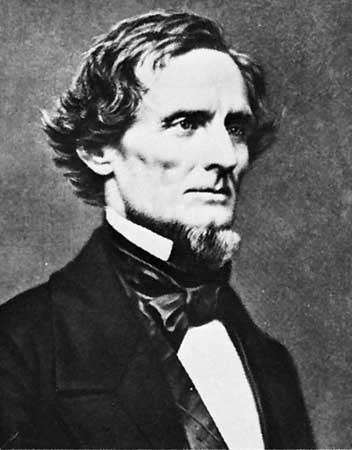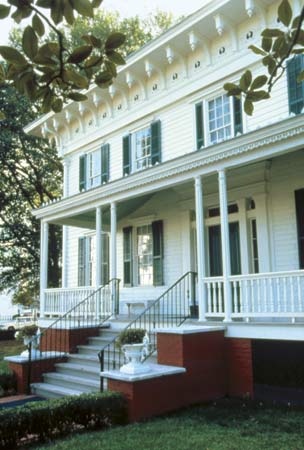Davis, Jefferson
president of Confederate States of America
Introduction
born June 3, 1808, Christian county, Ky., U.S.
died Dec. 6, 1889, New Orleans, La.
 president of the Confederate States of America throughout its existence during the American Civil War (1861–65). After the war, he was imprisoned for two years and indicted for treason but never tried.
president of the Confederate States of America throughout its existence during the American Civil War (1861–65). After the war, he was imprisoned for two years and indicted for treason but never tried.Early life and career
Jefferson Davis was the 10th and last child of Samuel Emory Davis, a Georgia-born planter of Welsh ancestry. When he was three his family settled on a plantation called Rosemont at Woodville, Miss. At seven he was sent for three years to a Dominican boys' school in Kentucky, and at 13 he entered Transylvania College, Lexington, Ky. He later spent four years at the United States Military Academy at West Point, graduating in 1828.
Davis served as a lieutenant in the Wisconsin Territory and afterward in the Black Hawk War under the future president, then Colonel Zachary Taylor, whose daughter Sarah Knox he married in 1835. According to a contemporary description, Davis in his mid-20s was “handsome, witty, sportful, and altogether captivating.” In 1835 Davis resigned his commission and became a planter near Vicksburg, Miss., on land given him by his rich eldest brother, Joseph. Within three months his bride died of malarial fever. Grief-stricken, Davis stayed in virtual seclusion for seven years, creating a plantation out of a wilderness and reading prodigiously in constitutional law and world literature.
In 1845 Davis was elected to the U.S. House of Representatives and, in the same year, married Varina Howell, a Natchez aristocrat who was 18 years his junior. In 1846 he resigned his seat in Congress to serve in the war with Mexico as colonel in command of the First Mississippi volunteers, and he became a national hero for winning the Battle of Buena Vista (Buena Vista, Battle of) (1847) with tactics that won plaudits even in the European press. After returning, severely wounded, he entered the Senate and soon became chairman of the Military Affairs Committee. President Franklin Pierce (Pierce, Franklin) made him secretary of war in 1853. Davis enlarged the army, strengthened coastal defenses, and directed three surveys for railroads to the Pacific.
During the period of mounting intersectional strife, Davis spoke widely in both North and South, urging harmony between the sections. When South Carolina withdrew from the Union in December 1860, Davis still opposed secession, though he believed that the Constitution gave a state the right to withdraw from the original compact of states. He was among those who believed that the newly elected president, Abraham Lincoln, would coerce the South and that the result would be disastrous.
President of the Confederacy
 On Jan. 21, 1861, twelve days after Mississippi seceded, Davis made a moving farewell speech in the Senate and pleaded eloquently for peace. Before he reached his Brierfield plantation, he was commissioned major general to head Mississippi's armed forces and prepare its defense. But within two weeks the Confederate Convention in Montgomery, Ala., chose him as provisional president of the Confederacy. He was inaugurated on Feb. 18, 1861, and his first act was to send a peace commission to Washington, D.C., to prevent an armed conflict. Lincoln (Lincoln, Abraham) refused to see his emissaries and the next month decided to send armed ships to Charleston, S.C., to resupply the beleaguered Union garrison at Fort Sumter. Davis reluctantly ordered the bombardment of the fort (April 12–13), which marked the beginning of the American Civil War. Two days later Lincoln called for 75,000 volunteers, a move that brought about the secession of Virginia and three other states from the Union.
On Jan. 21, 1861, twelve days after Mississippi seceded, Davis made a moving farewell speech in the Senate and pleaded eloquently for peace. Before he reached his Brierfield plantation, he was commissioned major general to head Mississippi's armed forces and prepare its defense. But within two weeks the Confederate Convention in Montgomery, Ala., chose him as provisional president of the Confederacy. He was inaugurated on Feb. 18, 1861, and his first act was to send a peace commission to Washington, D.C., to prevent an armed conflict. Lincoln (Lincoln, Abraham) refused to see his emissaries and the next month decided to send armed ships to Charleston, S.C., to resupply the beleaguered Union garrison at Fort Sumter. Davis reluctantly ordered the bombardment of the fort (April 12–13), which marked the beginning of the American Civil War. Two days later Lincoln called for 75,000 volunteers, a move that brought about the secession of Virginia and three other states from the Union.Davis faced a dire crisis. A president without precedent, he had to mold a brand-new nation in the midst of a war. With only one-fourth the white population of the Northern states, with a small fraction of the North's manufacturing capacity, and with inferior railroads, no navy, no powder mills, no shipyard, and an appalling lack of arms and equipment, the South was in poor condition to withstand invasion. Its only resources seemed to be cotton and courage. But at Bull Run (Manassas, Va.), on July 21, 1861, the Confederates routed Union forces. In the meantime, with makeshift materials, Davis created factories for producing powder, cannon, side arms, and quartermaster stores. In restored naval yards gunboats were constructed, and the South's inadequate railroads and rolling stock were patched up repeatedly. Davis sent agents to Europe to buy arms and ammunition, and he dispatched representatives to try to secure recognition from England and France.
Davis made the inspired choice of Robert E. Lee (Lee, Robert E.) as commander of the Army of Northern Virginia in June 1862. While Davis' military judgment was occasionally at fault, he wisely gave Lee wide scope in conducting the war over the next three years. Perhaps Davis' most serious mistake as commander in chief was the excessive importance he attached to defending the Confederate capital at Richmond, Va., at the expense of operations farther west, including the defense of the key Confederate fortress at Vicksburg, Miss.
Davis had innumerable troubles during his presidency, including a squabbling Congress, a dissident vice president, and the constant opposition of extreme states'-rights advocates, who objected vigorously to the conscription law he had enacted over much opposition in 1862. But despite a gradually worsening military situation, unrelieved internal political tensions, continuing lack of manpower and armament, and skyrocketing inflation, he remained resolute in his determination to carry on the war, and Lee remained both his most valuable field commander and his most loyal personal supporter.
Capture and imprisonment
When Lee surrendered to the North without Davis' approval, Davis and his cabinet moved south, hoping to reach the trans-Mississippi area and continue the struggle until better terms could be secured from the North. At dawn on May 10, 1865, Davis was captured near Irwinville, Ga. He was imprisoned in a damp casemate at Fort Monroe, Va., and was put in leg-irons. Though outraged Northern public opinion brought about his removal to healthier quarters, Davis remained a prisoner under guard for two more years. Finally, in May 1867, he was released on bail and went to Canada to regain his shattered health. Several notable Northern lawyers offered their free services to defend him in a treason trial, which Davis longed for. The government, however, never forced the issue, many believe because it feared that such a trial might establish that the original Constitution gave the states a right to secede. The case was finally dropped on Dec. 25, 1868.
Davis made five trips to Europe in an effort to regain his health, and for a few years he served as president of an insurance company in Memphis, Tenn. In 1877 he retired to Beauvoir, a small Gulf-side estate near Biloxi, Miss., which a patriotic admirer provided for him. There he wrote his Rise and Fall of the Confederate Government. Though pressed to enter the U.S. Senate, he declined to “ask for amnesty,” for he felt he had done nothing wrong in fighting for states' rights under the Constitution, and he never regained his citizenship. He remained the chief spokesman and apologist for the defeated South. Davis' citizenship was restored posthumously in 1978.
Though dedicated to the principles of democracy, Davis was by nature a benevolent aristocrat. He was diplomatic to a degree, but he did not possess the pliancy of the professional politician. His sensitivity to criticism stood in stark contrast to the single-minded imperturbability with which his greater counterpart, Abraham Lincoln, pursued his own war aims. Davis died in 1889 in New Orleans of a complicated bronchial ailment. At his temporary interment he was accorded the greatest funeral the South had ever known. On May 31, 1893, he was buried permanently in Hollywood Cemetery in Richmond.
Additional Reading
The first biography of Jefferson Davis was by one who knew and understood him, Frank H. Alfriend, The Life of Jefferson Davis (1868). Other biographies are Hudson Strode, Jefferson Davis, 3 vol. (1955–64), written with access to more than 1,000 hitherto unknown holograph letters owned by Davis' grandson; William Catton and Bruce Catton, Two Roads to Sumter (1963, reissued 1971), tracing Lincoln's and Davis' paths to war; Clement Eaton, Jefferson Davis (1977); Paul D. Escott, After Secession: Jefferson Davis and the Failure of Confederate Nationalism (1978); Michael B. Ballard, A Long Shadow: Jefferson Davis and the Final Days of the Confederacy (1986), covering the years 1865 to Davis' death; William C. Davis, Jefferson Davis: The Man and His Hour (1991); and Herman Hattaway and Richard E. Beringer, Jefferson Davis, Confederate President (2002).
- Foppa, Vincenzo
- forage
- foraminiferan
- Forbach
- Forberg, Friedrich Karl
- Forbes
- Forbes Burnham
- Forbes' disease
- Forbes, Duncan
- Forbes, Edward
- Forbes, George William
- Forbes, James David
- Forbes, Malcolm S.
- Forbes-Robertson, Sir Johnston
- Forbes, Steve
- Forbidden City
- forbidden lines
- Forbin, Claude de
- Forbush effect
- Forcados River
- force
- Force Acts
- forced labour
- Force, Juliana Rieser
- force, line of